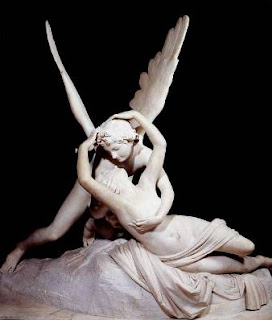
According to Freud, our life is played out in two different, opposing forces. One of them, Eros, is the drive for sex, love, and self-preservation, whereas the other is known as Thanatos, the drive for death and self-destruction. It is the yin and yang of motivations and urges. Put simply, Eros wants us to live and struggle through and with pain and suffering; Thanatos prefers to end it all with death, the equalizer, the dark force, the state of constant peace, calm, and rest.
There are many people who deny they have a dark side and deem themselves as thoroughly good. As a result, they often close up to all that could pose a threat to their (false) sense of security; they are paranoid about anything that might trigger “sinful” and “harmful” thoughts within them and strictly avoid sex, drugs and rock'n'roll.
Yet the dark side within is really part of human nature; we cannot deny its existence, nor fight against it through vicious attacks; all we can do is accept and embrace it, so it doesn't creep up and hide behind our thoughts and make us do horrendous things.
The healthy person does not ignore his or her dark side and tries to keep track of its movements by shining a large searchlight on the dark side's plans and motivations, so as not to be caught red-handed and unawares.
The line between sanity and insanity may be much thinner than we may suppose. Mostly, it may be carried out in the restricted area of our subconscious. The neurotic is obsessed with their thoughts and actions; the psychotic is losing - or has just lost - control of the flow of thoughts and actions, while the psychopath is spontaneously acting out violence and deriving pleasure from sadistic acts.
Schadenfreude, a milder expression of our dark nature, is a German term that best describes taking pleasure in other people's sufferings. Of course, it ranges in intensity and gravity, but the main idea behind this is the fact that the misfortune is funny and enjoyable because it is not happening to me.
We may not be the agent or cause of other people's suffering, yet we still take delight in it. This explains the popularity of shows like “America's Funniest Videos” where falls or hits in the groins are met with roaring laughter. In these cases, we are feeding our dark nature some snacks, an innocent-looking form of catharsis. We do not harm them, nor do we feel their pain, but we laugh at their mishaps gleefully.
Is Schadenfreude dangerous? It really depends. It may desensitize us to other people's sufferings. It should be kept in check obviously as most of us do not want to end up as sociopaths.
Yet at the same time, Schadenfreude can actually protect us from ourselves, mainly from Thanatos, the drive that wants us to destroy ourselves, the urge that makes you suddenly want to jump onto a moving train, for no specific reason whatsoever; it is the evil voice inside your head that is tempting you to gamble away all your money leaving you with nothing at all.
The voice becomes most adamant when things are going really well reminding us that we are all walking a thin, mortal line, while misfortune and death may be just around the bend.
In such cases, Freud proposes an effective remedy, one that is unfortunately not heeded enough in today's culture and society: Taking refuge in Art.
By producing many of these temptations in written, visual or musical form, these demons may give us a respite for a while. We experience a form of catharsis on a deeper level, much more potent than the temporary relief of Schadenfreude. And we come out of it a little lighter, a little happier, and a little more sane.

